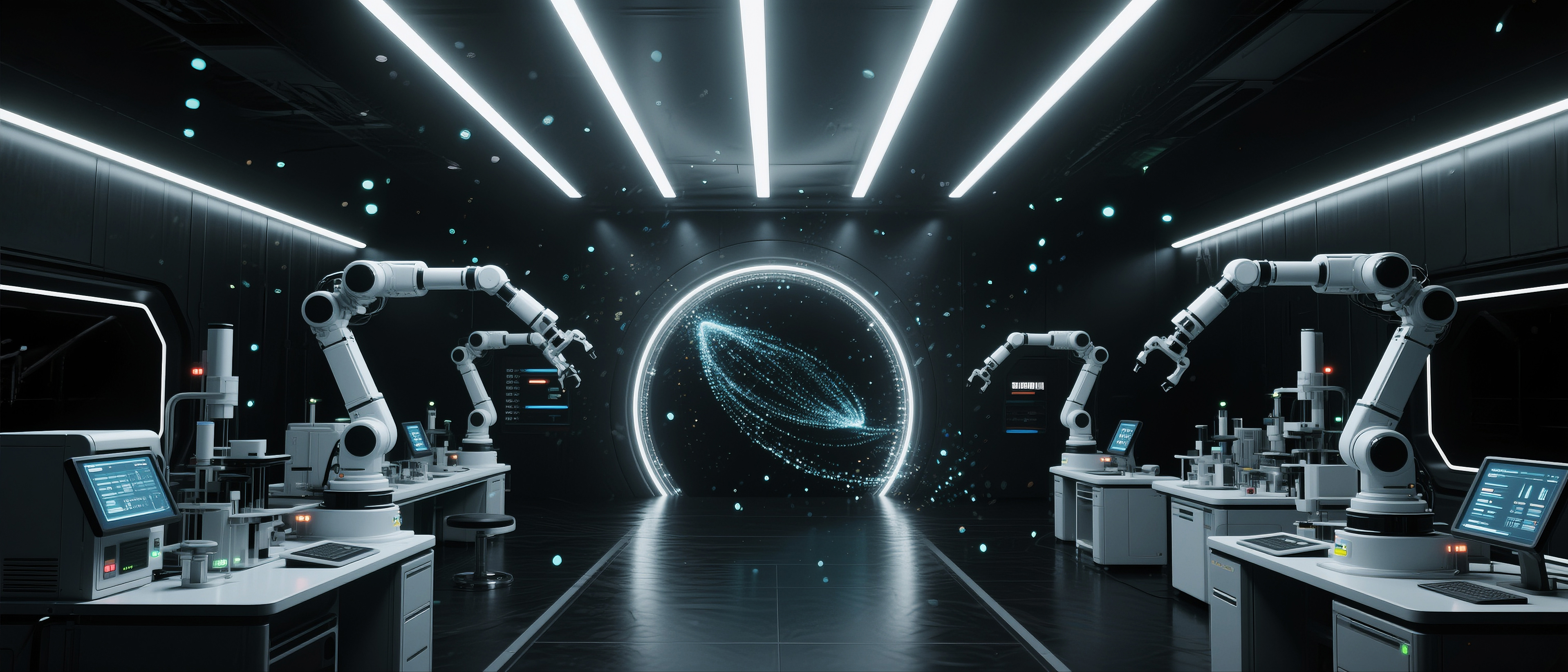The capital's science and technology community discusses studying and implementing the spirit of the 4th Plenary Session of the 20th Party Congress: "Driving high-level scientific and technological self-reliance and strength—this is a responsibility we take very seriously!"
Published Time:
2025-10-28
From October 20 to 23, the Fourth Plenary Session of the 20th Central Committee of the Communist Party of China was successfully held in Beijing. The session heard and discussed the work report delivered by General Secretary Xi Jinping on behalf of the Politburo of the Central Committee, and审议通过 (reviewed and approved) the "Suggestions of the CPC Central Committee on Formulating the 15th Five-Year Plan for National Economic and Social Development" (hereinafter referred to as the "Suggestions").
From October 20 to 23, the Fourth Plenary Session of the 20th Central Committee of the Communist Party of China was successfully held in Beijing. The session heard and discussed the work report delivered by General Secretary Xi Jinping on behalf of the Politburo, and审议通过了 the "CPC Central Committee's Proposal on Formulating the 15th Five-Year Plan for National Economic and Social Development" (hereinafter referred to as the "Proposal").

(The 4th Plenary Session of the 20th Central Committee of the Communist Party of China was held in Beijing from October 20 to 23, 2025. The meeting was chaired by the Politburo of the Central Committee. Xinhua News Agency reporter Li Xiang photographed the event.)
The spirit of the plenary session has sparked widespread discussion and deep resonance across Beijing's Municipal Science & Technology Commission, the Zhongguancun Administrative Committee system, and the capital's science and technology community. Everyone unanimously emphasized that achieving scientific and technological self-reliance and strength is the cornerstone of national prosperity and a critical component of national security. As we advance Chinese-style modernization, scientific innovation must take the lead and shoulder the heaviest responsibilities. Driving high-level scientific and technological self-reliance and fostering new-quality productivity—Beijing stands at a moment of glorious mission and immense responsibility.
Zhang Jihong, Party Secretary and Director of the Beijing Municipal Science & Technology Commission and the Zhongguancun Administrative Committee, stated: "General Secretary Xi Jinping's important speech at the plenary session, along with the "Suggestions" adopted at the meeting, provide top-level design and strategic vision for China's development over the next five years. These documents serve as a comprehensive mobilization and overall blueprint for seizing the momentum and steadily advancing Chinese-style modernization. Notably, the plenary session underscores the leading role of scientific and technological innovation, setting "significantly enhanced capabilities for scientific and technological self-reliance and strength" as one of the key economic and social development goals for the 15th Five-Year Plan period. Moreover, it dedicates an entire chapter to the strategic task of "accelerating high-level self-reliance and strength in science and technology, thereby driving the development of new-quality productive forces." This clearly demonstrates the central leadership with Comrade Xi Jinping at its core—along with the entire Party—to its unwavering commitment to and high expectations for innovation-driven growth."
Beijing is the region in our country with the strongest scientific and technological foundation, the most concentrated innovation resources, and the most dynamic innovation entities. Driving high-level self-reliance and self-strengthening in science and technology, and fostering new-quality productivity—Beijing shoulders a glorious mission with immense responsibilities. Moving forward, we will embrace a spirit of urgency, seizing every moment to act, and firmly align ourselves with the key goals and strategic tasks for economic and social development during the 15th Five-Year Plan period. In close alignment with the overall plan for building an international center of science and innovation, we will leverage Beijing’s integrated mechanism for education, science, technology, and talent development. We will vigorously implement initiatives such as the Leading Action on Basic Research and the Focused Action on Critical Core Technologies, helping us secure a commanding position in global scientific and technological advancement, significantly boosting the supply of high-quality innovations, and promoting the deep integration of technological and industrial innovation. Additionally, we will launch a new round of pioneering reforms in Zhongguancun, accelerating the construction of a world-class, cutting-edge science park. Our ultimate aim is to establish Beijing as a leading示范区 (demonstration zone) for developing new-quality productivity, empowering the capital’s high-quality growth and paving the way for China to become a global leader in science and technology—a testament to our unwavering commitment to building a science-and-technology powerhouse and achieving high-level self-reliance and self-strengthening in science and technology.
Han Jian, Director of the Information Technology Division at Beijing Municipal Science & Technology Commission and Zhongguancun Administrative Committee, stated: "During the plenary session, General Secretary Xi Jinping's important speech clearly outlined the direction for China's economic and social development over the next five years. The plenary session specifically highlighted 'accelerating high-level scientific and technological self-reliance and strength to drive the development of new-quality productive forces,' further emphasizing the deep integration of technological innovation with industrial innovation. This reflects the Party and the state's heightened emphasis on and even greater expectations for scientific and technological advancement."
The "Proposal" calls for accelerating innovation in digital and intelligent technologies such as artificial intelligence, comprehensively implementing the "AI Plus" initiative, and prioritizing quantum technology, embodied intelligence, and 6G as key areas for future industrial development—aiming to turn these into new drivers of economic growth. As tech professionals in the field of information technology, we deeply recognize the weight of our responsibility and the honor of our mission. Moving forward, as we propel the development of next-generation IT technologies led by AI, we must firmly align ourselves with the strategic directives of the Party Central Committee, ensuring unity in both thought and action. We must clearly understand the current landscape and our tasks at hand: fully leveraging the institutional advantages of China's unique national system to bolster autonomous innovation capabilities across the board; strengthening the efficient supply of critical resources like computing power, algorithms, and data; proactively exploring cutting-edge fields such as world models, embodied intelligence, and quantum-AI integration; and vigorously supporting disruptive technological innovations to secure a leading edge in scientific and technological advancement. Moreover, we must deepen the implementation of the "AI Plus" initiative, driving the widespread adoption of high-value applications that continuously unlock new forms of productive forces. Over the next five years, we must seize the historic opportunities presented by the ongoing wave of scientific and industrial transformation, working together to write a new chapter of self-reliance and independent strength in science and technology at an advanced level.
Guo Lantao, Director of the Medical and Health Technology Division at Beijing Municipal Science & Technology Commission and Zhongguancun Administrative Committee: "The 'Suggestions' represent the most significant achievement of the Fourth Plenary Session of the 20th Central Committee of the Communist Party of China. They provide an in-depth analysis of the profound and complex changes facing China's development environment, while also outlining a top-level design and strategic blueprint for the next five years. Specifically addressing scientific and technological innovation, the 'Suggestions' propose major initiatives such as 'strengthening original innovation and tackling key core technologies, and fostering deep integration between technological innovation and industrial innovation,' aiming to comprehensively enhance our nation's independent innovation capabilities and secure a leading position in the global technology race.'"
As science and technology professionals dedicated to advancing Beijing’s pharmaceutical and healthcare industry, we will respond pragmatically to the central government’s directives. We will actively leverage the dual leadership roles of our science and innovation departments alongside industry regulators, diligently fulfilling the responsibilities of the Office of the Municipal Pharmaceutical and Healthcare Coordination Joint Conference. Together with the “Three Medical” sectors, we will steadfastly focus on fostering innovation—spanning from pioneering research to platform development, seamless R&D-review integration, and comprehensive end-to-end services—while deeply implementing the spirit of the recent plenary session. We are committed to supporting innovative players in the pharmaceutical sector and aligning our efforts with national strategies and regional growth priorities. To stay ahead, we’ll strategically invest in cutting-edge fields such as AI-powered healthcare solutions, cell and gene therapies, and brain-computer interfaces—emerging areas poised for transformative impact. By doing so, we aim to unlock fresh momentum for the industry while simultaneously prioritizing both innovation and commercialization. Moreover, we’ll strengthen our ecosystem by bolstering platforms, incubators, talent development, and financial resources, creating a powerful "magnetic field" that attracts top-tier innovations. Ultimately, this approach will accelerate the launch of groundbreaking new drugs and medical devices, contributing significantly to Beijing’s vision as an international hub for scientific and technological innovation—and enhancing the health and well-being of our people.
Du Ling, Director of the Park Department at the Zhongguancun High-Tech Industry Promotion Center: "The 'Proposal' is forward-thinking and profoundly significant, boasting strong theoretical depth, innovative spirit, and practical relevance. As participants and drivers in the development of Zhongguancun—a world-leading science and technology park—we must seize this golden opportunity, proactively adapt to changes, and relentlessly pursue innovation and exploration. In key areas such as artificial intelligence and healthcare, as well as emerging industries like embodied intelligence and bio-manufacturing, we will foster deep integration among industry, academia, and research. This will ensure smooth flows across the innovation, industrial, talent, and capital chains, while also enhancing the park's supporting infrastructure for industries. By doing so, we can deliver even higher-quality public and industrial services, creating a specialized, distinctive, and internationally competitive high-end特色 industrial park. Ultimately, we aim to optimize the 'fertile ground for innovation and entrepreneurship,' accelerate the commercialization of scientific and technological breakthroughs, continuously energize all types of innovation entities, generate more globally pioneering research outcomes, and cultivate a group of top-tier enterprises along with a tiered ecosystem of growing businesses—thereby speeding up the formation of a world-class, industry-leading cluster."
Zhu Songchun, Director of the Beijing Academy of General Artificial Intelligence, Director of the National Key Laboratory for Cross-Media General AI, and Chair Professor at Peking University and Tsinghua University's Chair Professor of Basic Sciences, stated: "The Beijing Academy of General Artificial Intelligence and the National Key Laboratory for Cross-Media General AI are actively embracing the spirit of the conference. Moving forward, we plan to establish an international ecosystem for the research and development of general AI technologies, aiming to achieve groundbreaking advancements in areas such as general AI modeling methodologies and foundational software, thereby comprehensively enhancing the capabilities of versatile intelligent agents. We will further deepen the integration of 'theoretical innovation' with 'industrial application,' refining our innovative 'learning-research-industry-collaboration' system to ensure the practical implementation of general AI systems in critical sectors. Relying on a robust framework that combines 'research and engineering,' we will leverage the strengths of both the Academy and Peking University to break through key bottlenecks in cross-media general AI applications, ultimately forging a comprehensive theoretical foundation for intelligent science. Looking ahead, we will continue to strengthen fundamental research in the field of general AI, seamlessly integrating cutting-edge technological breakthroughs from diverse AI domains—including vision, language, cognitive reasoning, learning, planning, and action—to drive sustained progress in this transformative area."
Nie Zuoren, an academician of the Chinese Academy of Engineering, Deputy Secretary of the Party Committee and President of Beijing University of Technology, and Director of the National Key Laboratory for Material Circulation, Low-Carbon Recycling: The "Suggestions" reviewed and approved at the Fourth Plenary Session of the 20th Central Committee of the Communist Party of China have outlined a blueprint for China's development over the next five years, providing top-level design and strategic planning that are both rich in content and inspiring. The National Key Laboratory for Material Circulation, Low-Carbon Recycling is the only national key laboratory led and constructed by a university directly under the Beijing municipal government. It is spearheaded by Beijing University of Technology, in collaboration with Beijing Building Materials Science Research Institute Co., Ltd. and Beijing Jingneng Technology Co., Ltd. During the 15th Five-Year Plan period, we will continue to closely align ourselves with national strategic needs, boldly pursue innovation, and actively explore new frontiers in material lifecycle engineering, efficient resource recycling, and low-carbon energy development. We will tackle tough challenges head-on, delivering groundbreaking innovations in new materials technologies and providing critical material support to enable ultra-large cities to achieve highly efficient, high-quality resource utilization and carbon neutrality goals. Furthermore, we will promote the integrated development of education, science & technology, and talent, contributing even greater strength to advancing China’s modernization drive and realizing the grand vision of national rejuvenation and prosperity.
Wang Lai, Director of the National Key Laboratory for Wide-Bandgap Semiconductor Lighting Materials and Technologies, stated: "The 'Suggestions' reviewed and approved at the Fourth Plenary Session of the 20th Central Committee of the Party have clearly outlined our path forward. Drawing inspiration from General Secretary Xi Jinping's important speech on advancing the modernization of China's governance system and governance capabilities, I have the following visions for our next steps: First, in terms of research direction, I will place greater emphasis on the nation’s strategic need for achieving high-level scientific and technological self-reliance and strength. Focusing on the critical core technologies in the field of wide-bandgap semiconductor optoelectronic materials, we will intensify efforts to tackle original and pioneering scientific challenges. In particular, we aim to make breakthroughs in areas such as Micro-LED industrialization technology and deep-ultraviolet LED application technologies, thereby contributing to China’s transition from being a ‘follower’ to a global ‘leader’ in these key fields. Second, regarding team building, I will strive to create an innovative team that seamlessly integrates industry, academia, research, and application. We will simultaneously prioritize both talent development and scientific innovation, nurturing more young scientific and technological professionals. At the same time, we will establish robust collaborative innovation mechanisms, strengthen partnerships with enterprises, and accelerate the commercialization of scientific and technological achievements—providing strong support for fostering new forms of productive forces. Finally, in terms of serving society, I will actively participate in the formulation and implementation of major national science and technology strategies, offering my expertise to further refine and enhance China’s national innovation ecosystem."
Zhang Zhaoxiang, a researcher at the Institute of Automation of the Chinese Academy of Sciences, said: "Witnessing the important remarks on scientific and technological innovation made at the Fourth Plenary Session of the 20th Central Committee of the Communist Party of China fills me with profound excitement and inspiration as a science and technology professional. In particular, the cutting-edge fields we are focusing on—such as artificial intelligence and embodied intelligence—are precisely the global technological high grounds that countries around the world are fiercely competing to secure. These are also the critical areas where we urgently need to make breakthroughs. As researchers, we will wholeheartedly respond to the nation's call, dedicating ourselves fully to our work and striving tirelessly to deliver scientific achievements that live up to the expectations of our era and the earnest hopes of the General Secretary. More importantly, the scientific and technological innovations we champion must go beyond theoretical discussions or mere academic publications and patent applications—they should be deeply integrated with the real economy, genuinely empowering the development of new-quality productivity. At the same time, we must closely align the cultivation of innovative talent with industrial upgrading, steadily propelling China's scientific and technological endeavors forward and making our own proactive contributions toward achieving self-reliance and strength in science and technology."
Wang Yequan, a researcher at the Beijing Academy of Artificial Intelligence (BAAI), stated: "Currently, accelerating the deployment of major scientific and technological innovation initiatives and continuously boosting the supply of high-quality technology have become strategic moves to drive the development of new productivity models and secure a competitive edge in future industries. In cutting-edge fields such as artificial intelligence, large-scale models, embodied intelligence, and robotics, we are witnessing a profound transformation. These technologies not only serve as 'tech vanguards' leading industrial upgrades but also act as 'thoughtful assistants' dedicated to improving people's livelihoods. Looking ahead, fostering the integrated innovation of technologies like large-scale models and robotics is the inevitable path toward advancing AI to even higher levels. We must courageously explore uncharted territories at the forefront of science and technology, while ensuring that the fruits of innovation benefit everyday citizens. Through systematic strategic planning and sustained delivery of high-quality technological solutions, we will undoubtedly seize the initiative in this technological revolution, injecting robust and enduring intelligent momentum into our journey toward high-quality development."
Chi Haipeng, Founder and Chairman of Beijing Dyna Experimental Technology Co., Ltd.: "The development blueprint for the 15th Five-Year Plan, outlined at the Fourth Plenary Session of the 20th Central Committee of the Communist Party of China, has deeply inspired us, as technology entrepreneurs. We profoundly recognize the Party's strategic determination to drive intelligent upgrades across industries and solidify the foundation for robust real-sector growth. Moreover, the plenary session has laid out critical plans to accelerate China's pursuit of high-level scientific and technological self-reliance and strength—aligning perfectly with Dyna Technology's long-standing mission to overcome key core technologies through original innovation. As an innovative pioneer in AI-powered, 'dark-lab' full-lifecycle intelligent services, Dyna Technology is committed to playing a pivotal role as a technology enabler, helping laboratories evolve from 'tool automation' to 'decision intelligence.' In doing so, we aim to enhance our nation's capacity for original innovation and ensure greater autonomy and control in vital fields such as biomedicine and advanced materials."
Wang Yu, Founder and Chairman of Rosenbot: "As an entrepreneur deeply rooted in the medical robotics field, I felt a profound sense of resonance when I heard the call to 'speed up the deployment and advancement of major scientific and technological innovation initiatives, and continuously enhance the supply of high-quality technology.' Rosenbot has grown from a laboratory project into a rising star in the orthopedic surgical robot sector, developing the world's only intelligent fracture-reduction robot—technology that has benefited immensely from the guidance of our nation's science and innovation strategy, as well as the nurturing environment of Zhongguancun's vibrant innovation ecosystem. This experience has given me a genuine understanding of the "15th Five-Year Plan" blueprint for scientific and technological innovation outlined at this conference. Moving forward, we will remain committed to tackling core technologies head-on, accelerating the commercialization of our breakthroughs, and contributing Rosenbot's strength to bolstering the supply of high-quality technology."
Yang Kun, Co-founder and Chief Security Researcher at Beijing Changting Technology Co., Ltd.: As a co-founder of an intelligent cybersecurity enterprise, I am deeply moved by the CPC’s 20th Central Committee’s Fourth Plenary Session and the "15th Five-Year Plan" regarding technological innovation. The "15th Five-Year Plan" proposes strengthening original innovation and tackling key core technologies, while also promoting the deep integration of scientific and technological innovation with industrial innovation. Meanwhile, the recent press conference emphasized the need to comprehensively implement the "AI Plus" initiative, empowering industries across the board and driving transformative growth in countless sectors. We firmly recognize that breakthroughs in core technology innovation are the linchpin for supporting China’s high-quality scientific and technological development—and indeed, for advancing our nation’s broader socialist modernization. Leveraging our company’s unique strengths, Changting Technology will focus on two key areas to concretely put these strategic directives into practice: First, we’ll harness the power of "AI Plus" to revolutionize cybersecurity. By integrating cutting-edge AI technologies, we aim to intelligently enhance threat detection, risk assessment, and incident response capabilities, ultimately enabling the construction of proactive defense systems. This approach will effectively address the fragmented nature of current cybersecurity solutions, significantly bolstering the resilience of China’s critical information infrastructure. Second, we’ll prioritize building robust security frameworks for AI itself. From assessing large-scale model safety risks to ensuring code integrity, we’re committed to establishing a comprehensive AI security governance system that spans the entire lifecycle—from research and development through deployment to practical application. This ensures that the rapid advancement of "AI Plus" remains safe,可控, and aligned with national priorities. We believe that only by simultaneously advancing AI innovation and strengthening AI security governance—fostering a symbiotic relationship between empowerment and regulation—can we truly meet the demands of China’s high-quality scientific and technological development. In doing so, we will provide a solid foundation of security assurance for China’s journey toward becoming a digital powerhouse and a cyber-superpower.
Du Hongqun, Vice Chairman and Secretary-General of the Zhongguancun Industry Technology Alliance Federation, stated: "After reviewing the strategic deployment on scientific and technological innovation outlined at the Fourth Plenary Session of the 20th Central Committee of the Communist Party of China, we deeply recognize the significant responsibility—and equally feel greatly inspired—as a vital platform that bridges industry, academia, research, and application, driving collaborative innovation. The spirit of the plenary session underscores the critical role of technology in empowering the real economy. Zhongguancun's Industry Technology Alliance boasts a unique advantage: it brings together enterprises from across the entire industrial chain, along with universities and cutting-edge research institutions. We will actively respond to the call by proactively establishing 'innovation consortia,' focusing particularly on前沿 fields like artificial intelligence. Together, we’ll tackle common industry challenges and address key bottlenecks that have long hindered progress, accelerating the transformation of groundbreaking lab innovations into tangible momentum on production lines. This, in turn, will directly support the development of a modernized industrial system. Moving forward, we will thoroughly grasp and earnestly implement the guiding principles of the plenary session, rallying and uniting all our member organizations to translate the nation’s strategic vision into concrete actions for collaborative innovation. In doing so, we aim to contribute the alliance’s distinctive strength to the cultivation of new, high-quality productivity, propelling China toward sustained growth and global competitiveness."
Zhang Yingfei, Vice President of Zhongguancun Zhiyou Institute and Head of the Incubation Department at Zhiyou·Yarui Science & Innovation Platform: Deeply studying the important remarks on scientific and technological innovation made at the Fourth Plenary Session of the 20th Central Committee of the Communist Party of China has resonated profoundly with me as someone who has been dedicated for years to the frontlines of research transformation and incubation. At the heart of our work lies the crucial task of bridging the "last mile" between scientific innovation and the real economy. That’s precisely why I feel a direct connection to the session’s emphasis on "developing new-quality productive forces." At the Zhiyou·Yarui Science & Innovation Platform, we spend every day identifying, nurturing, and empowering cutting-edge technology projects with the greatest potential—particularly in fields like artificial intelligence. Our goal is crystal clear: not only do we assess the technological sophistication of these innovations, but we also rigorously evaluate their viability for industrial application. By providing targeted support and resources, we ensure that groundbreaking research results are no longer confined to shelves—they can instead take root, flourish, and ultimately become the driving force behind transformative changes in industry—truly embodying the essence of "new-quality productive forces."
Wang Yu, General Manager of Beijing Zhongguancun Life Science Park Development Co., Ltd.: Looking ahead to the "15th Five-Year Plan" and embracing a new future, I will lead all employees of Life Park Company in continuing to deeply study and earnestly implement Xi Jinping Thought on Socialism with Chinese Characteristics for a New Era—particularly the General Secretary’s important discourses on scientific and technological innovation, as well as his guiding principles for Beijing’s development. We will remain fully focused on the goals set forth by the Fourth Plenary Session of the 20th Party Congress: accelerating China’s drive toward high-level scientific and technological self-reliance and strength, and leveraging this momentum to propel the development of new, high-quality productive forces. At the same time, we must seize the historic opportunities presented by the ongoing新一轮科技革命 and产业变革, wholeheartedly supporting research institutions and innovative enterprises within the park as they pursue groundbreaking original innovations and tackle critical core technologies. This includes fostering deep integration between technological innovation and industrial advancement. To further enhance our capabilities, we will refine and improve our incubation and technology-transfer service systems, boosting the overall efficiency of the innovation ecosystem and nurturing even more pioneering, innovative enterprises. Additionally, we will continue optimizing the park’s business environment, elevating its international standing, and actively attracting top global talent and cutting-edge projects. Standing at a new historical juncture, I pledge to align my thoughts and actions closely with the strategic decisions and deployments of the CPC Central Committee. Together, we will swiftly formulate Life Park Company’s "15th Five-Year Plan," contributing significantly to Beijing’s accelerated efforts in building itself into an international center for science and technology innovation—and, ultimately, playing a stronger role in propelling the growth of the life sciences and health industries!
Guo Jie, General Manager of Beihang Science and Technology Park Company: "In the golden autumn month of October, the Fourth Plenary Session of the 20th Central Committee of the Communist Party of China was successfully held, outlining a grand blueprint and making strategic arrangements for the nation's future development. General Secretary Xi Jinping’s important speech, along with the 'Suggestions' adopted at the meeting, are profound in thought and rich in content—they serve as a guiding charter for advancing all our endeavors. Beihang National University Science and Technology Park will thoroughly study and implement the spirit of the plenary session, transforming it into a powerful driving force for fostering high-quality development. Looking ahead, we will deeply embrace the principles articulated at the Fourth Plenary Session of the 20th Central Committee and General Secretary Xi Jinping’s important speech, using the 'Suggestions' as our roadmap to strategically chart new paths for growth. First, we will strengthen the leadership of our strategic scientific and technological capabilities, focusing on cutting-edge areas such as aerospace technology, artificial intelligence, and emerging industries, while optimizing resource allocation to strive for breakthroughs in critical core technologies. Second, we will enhance the efficiency of成果转化 (technology transfer and commercialization), building an integrated chain that spans 'basic research—technological innovation—technology transfer—industrial incubation.' This includes refining processes like concept validation, pilot-scale testing, and market introduction, thereby accelerating the industrial application of scientific and technological achievements. Finally, we will foster an open and collaborative innovation ecosystem, forging partnerships with government agencies, enterprises, investors, and other stakeholders to jointly establish innovation consortia and shared technology platforms. Together, we will create an internationally competitive innovation landscape, contributing Beihang’s unique strength to the nation’s journey toward becoming a science and technology powerhouse!"
Wang Lei, General Manager of Fushi Investment, the operator of Zhongguancun (Chaoyang) Internet 3.0 Industrial Park, stated: "The '14th Five-Year Plan' proposals, approved at the Fourth Plenary Session of the 20th Central Committee of the Communist Party of China, have injected strong confidence and provided a clear direction for the development of science and technology industrial parks. In particular, the commitment to 'focusing on the real economy as the cornerstone of economic development, while advancing in the directions of intelligence, green initiatives, and integration' aligns perfectly with the development path we’ve been actively pursuing every day. Currently, the park has attracted a group of innovative enterprises deeply rooted in fields such as AI, blockchain, and big data—including Newme Group, Xunzhong Shares, and Hongshi Yangguang. By establishing shared technology platforms like light-field capture and motion-capture systems, we’ve genuinely helped companies lower their R&D costs and ease the barriers to innovation. Looking ahead to the '15th Five-Year Plan,' the park will serve as a powerful 'accelerator' for tackling critical technological challenges, demonstrating the responsibility and leadership that a leading science and technology park should embody!"
Hot Articles
Share to







